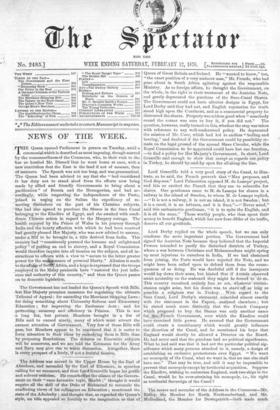Lord Derby replied on the whole speech, but we can
only condense the more important portion. The Government had signed the Austrian Note because they believed that the Imperial Powers intended to pacify the disturbed districts of Turkey, where a war between Christians and Mohammedans might spring up most injurious to ourselves in India. If we had abstained from joining, the Porte would have rejected the Note, and we might have been called upon to defend them from the conse- quences of so doing. He was doubtful still if the insurgents would lay down their arms, but hinted that if Austria observed strict neutrality on the seaboard they might be forced to do so. This country remained entirely free _to act, whatever circum- stances might arise, but his desire was to stave 'off as lceig as possible a religious war in . Turkey. With regard to the Suez Canal, Lord Derby's statement coincided almost exactly with the statement in the Papers, analysed elsewhere ; but he stated much more distinctly that the French Company which proposed to buy the Shares was only another name for the.-French Government, over which the Khedive could have exercised little power. He averred that the Government could create a constituency which would greatly influence the direction of the Canal, and he mentioned his hope that England would shortly be allowed a Director on the Board. He had never said that the purchase had no political significance. What he had said was that it had not the particular political sig- nificance which many persons attached to it, namely, a design of establishing an exclusive protectorate over Egypt. " We want no monopoly of the Canal, what we want is, that no one else shall have one." That may be true, and still it may bo impossible to prevent that monopoly except by territorial acquisition. Suppose the Khedive, wishing to embarrass England, sank two ships in the Canal, would he be over-straining his monopoly, i.e., his right as territorial Sovereign of the Canal ?


































